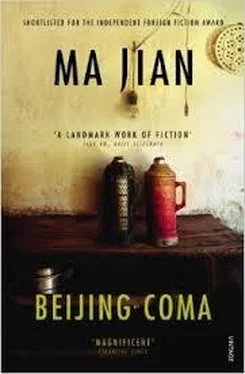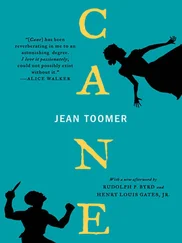‘I’ll get in touch with her…’ Yanyan’s voice takes me back to the autumn night in 1986, when she, Wang Fei and Mou Sen came round to this flat for a beer. They’d just arrived in Beijing. It’s hard to believe that fours years have elapsed since then.
After my stint in the Guangzhou hospital, I managed to pull myself together and graduate from Southern University with distinction. Wang Fei and I came up to Beijing University to do PhDs in molecular biology. Mou Sen went to Beijing Normal University to do a PhD in Chinese literature. He’d found the courage to turn his back on science and follow his passion. Yanyan secured a job as a reporter for the Workers’ Daily .
‘Insects are always crawling into his ears and nose, so I had to buy these tweezers,’ my mother says, touching my face. ‘His arms are covered in red blotches. He looks like a sick fish…’
I remember setting up the amplifiers in the canteen one afternoon during our first term at Beijing University. Frustrated by the slow pace of political reform, the students had set up unofficial ‘salons’ to discuss the taboo subjects of freedom, human rights and democracy. Some fellow science graduates and I had formed a discussion group called the Pantheon Society, and had invited the renowned astrophysicist Fang Li to give a lecture on China’s political future. He was an outspoken critic of the government. The students held him in high esteem. We nicknamed him China’s Sakharov. The previous month, the Democracy Salon, a rival forum founded by some liberal arts students, had invited the respected investigative reporter Liu Binyan to give a speech. So our society felt we needed to invite someone of Fang Li’s stature to gain the upper hand.
My first two months at Beijing University had gone well. I’d been assigned a tutor and begun preliminary discussions on my dissertation, ‘Primitive Biology in The Book of Mountains and Seas’ . In my free time, I pored over science journals in the library or helped organise the Pantheon Society’s numerous open meetings.
I was looking forward to Fang Li’s lecture, and had prepared some questions for him, such as, ‘Why do the people of southern China have so little interest in politics, and has this political apathy been instrumental in their region’s economic success?’ But after setting up the amplifiers, I had to go and buy a winter supply of cabbages for my mother. I queued for two hours in the freezing cold, then hauled the twenty cabbages back to the flat and stacked them up on the landing outside our front door. By the time I made it back to the campus, Fang Li’s lecture had almost finished. The canteen was packed. I stood outside an open window and caught the final words: ‘If the government is serious about reform, it must grant us freedom of speech and freedom of the press. These are fundamental human rights. Although they are not everything, without them we have nothing!’
When the audience broke into applause, I tried to squeeze myself inside the door. I didn’t want to be accused of shirking my duties.
‘Give Fang Li a teaching post at Beijing University!’ the students shouted over the applause. Wang Fei held up the banner he’d prepared beforehand and yelled, ‘Give us freedom of expression!’ Everyone stood up and echoed his cry. It suddenly felt very hot inside the canteen.
Shu Tong, the founder of our Pantheon Society, asked the students to shout after him, ‘Up with Democracy, down with Tyranny!’ then cleared his throat and said, ‘Now, it’s time for questions from the floor.’ Shu Tong was a shrewd and canny physics graduate from Shanghai. He was plump and pale-skinned, with well-groomed hair parted on one side, and a faint moustache that hung below his nose like a fine-tooth comb. He liked to cultivate the appearance and demeanour of a top Party leader.
‘Economic development isn’t dependent on political reform,’ Bai Ling said, rising to her feet. ‘The success of the Shenzhen Economic Zone is proof of that. China needs to build up its economy. That’s the priority now. It doesn’t matter whether we call our system capitalist or socialist, as long as it raises people’s living standards.’ Bai Ling was a psychology major. I often spotted her at our open meetings. She was tiny. She’d cut her hair into a short bob, but it didn’t make her look any taller.
‘I haven’t been to Shenzhen, but I’ve read a lot about it,’ Fang Li answered, pushing his glasses further up his nose. ‘Without a democratic political system in place, our economy will eventually flounder. The people’s wealth will be eaten up by the corrupt institutions of this one-party state.’
‘My name is Nuwa,’ another girl called out. ‘I’m an English literature major. Professor Fang, if we demand the right to elect our government and form opposition parties, won’t that make us counter-revolutionaries — criminals conspiring to subvert the state?’ She was a member of the university’s dance troupe. I noticed that she was wearing pink lipstick today. She raised her eyebrows and added, ‘Do you think you could give us a maxim and an aphorism?’
‘The Chinese people don’t want to be dictated to by the Communist Party,’ said Fang Li. ‘They want to be able to elect their public servants and hold them to account. Beijing University has a great democratic tradition. On 4 May 1919, three thousand students from this university gathered in Tiananmen Square to protest against China’s inability to stand up to the West. They argued that the only way to save the nation was to introduce democracy and science. The protest spawned the May Fourth Movement — the most intellectually vibrant period of Chinese history. Years of Communism crushed the May Fourth spirit, but I am confident that your generation will revive it, and bring China into a new age of enlightenment. For the first time in decades, students have been allowed to hold open discussions about China’s future. You must take advantage of this new political climate, and put pressure on the government to speed up the pace of reform. Remember, democracy is not granted, but won… My maxim is: “Don’t do to others what you don’t want done to yourself ”. My aphorism comes from Confucius’s Analects : “If I walk down the road with two other men, at least one of them will be my teacher.”’
Then Old Fu asked a question. He was the general secretary of the Postgraduate Student Association. Although he was only five years older than us, he had a wise, statesman-like air to him, which was why we all called him Old Fu. ‘I’m doing a PhD in physics, and have a very heavy workload,’ he said. ‘I’d like to get involved in politics and use my knowledge to help society in some way, but I don’t have the time to attend all these discussions and seminars.’
‘I’m a scientist too,’ said Professor Fang. ‘The future of our country is an issue that concerns every one of us, no matter which field of study we are pursuing.’ At this, everyone broke into applause again.
Having been stuck by the door for half an hour, I finally managed to edge myself further into the canteen. I raised my hand to ask a question, but Shu Tong didn’t spot me. What I wanted to ask was: ‘Who exactly did the Communists liberate? After the so-called Liberation in 1949, the Party drove one of my grandfathers to commit suicide, forced my uncle to murder the other, and locked my father up in labour camps for twenty years. They claimed they liberated the peasants. But the only peasants I’ve ever seen have been so destitute they don’t know where their next meal is coming from.’
It was another hour before the lecture finally came to a close. At the end of it, I felt more hopeful about China’s future and our ability to bring about change.
Читать дальше












